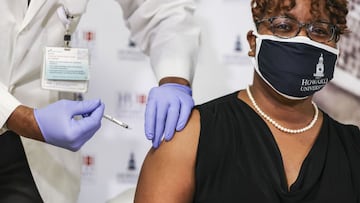When does the first round of vaccination start in the US?
Just as Covid-19 deaths in the US hit 300,000, the first batches of the Pfizer/BioNTech coronavirus vaccine were delivered across the country.

On the weekend when deaths from Covid-19 in the United States hit the 300,000-mark, the first consignments of Pfizer/BioNTech's coronavirus vaccine, 2.9 million doses arrived at 145 destinations across the country. More doses will be rolled out this week with around 600 sites receiving shipments from FedEx delivery trucks over the next 48 hours. The Pfizer/BioNTech vaccine was authorized for emergency use by a 23-member panel of the US Food and Drug Administration (FDA) on Friday.
Army General Gustave F. Perna, the chief operating officer for Operation Warp Speed who is overseeing distribution of the vaccine explained this weekend that the plan is for the vaccine to be allocated in a fair and equitable manner to all states and territories, who will stipulate the quantity needed. When asked who would be the first to receive the vaccine, Perna replied, “We've had over 100,000 people participate in trials. They were the first ones to receive the vaccine. They were the heroes to really help us get going”.
Sandra Lindsay, a nurse at a Queens hospital, was the first person in the U.S. to be vaccinated for the coronavirus. She wanted to “inspire people who look like me.” https://t.co/HlzO6H9fYk
— The New York Times (@nytimes) December 15, 2020
Sandra Lindsay, the first person to be vaccinated out of trials in the US
The first person not involved in a trial to be inoculated with the Pfizer vaccine in the US since its approval by the FDA was Sandra Lindsay – a 52-year-old critical care nurse who works at Long Island Jewish Medical Center. It was administered just after 9:20 hours on Monday morning by Northwell Health’s director of employee health services Michelle Chester. The historic event was streamed live on social media and broadcast by CNN. Dr. Yves Duroseau, chair of emergency medicine at Lenox Hill Hospital, was the second to receive the vaccination at the Long Island Center. Northwell president and CEO Michael Dowling said “This is what everybody’s been waiting for — to be able to give the vaccine, and hopefully this is the beginning of the end of the Covid issue”.
Frontline health workers like Sandra Lindsay plus members of the armed forces will be the first to be given the Pfizer vaccine although it is believed that some states have started to inoculate a small number of patients. This weekend’s shipments will provide enough doses to vaccinate 2.9 million people – all will require a second booster injection 21 days after the first. On Friday, it is expected that the FDA will give approval to another Covid-19 vaccine – the one developed by Moderna.
Which states will receive the first doses of the coronavirus vaccine?
Bill Gates predicts worst months of the covid-19 pandemic ahead
When is Trump White House staff receiving covid-19 vaccine?
Has the Electoral College confirmed Biden's victory?
Second stimulus check: could you get a $1,200 or $600 payment?
Stimulus check payments could be staggered across five groups
US to start mass vaccination programme in the New Year
Related stories
While a mass vaccination programme to start inoculating the general public is probably now just weeks away, it will require detailed planning and logistics – plus an effective campaign to persuade those have their doubts or are reticent about taking a drug which was developed and approved I record time. In a recent poll, around 40% of Americans said they would wait before having the vaccine and some are so skeptical that they are completely against being vaccinated at all – in spite of reports that the Pfizer vaccine, which has been granted regulatory approval in the United Kingdom, Canada, Bahrain and Saudi Arabia, has been medically proved to be 95% effective against Covid-19. In the initial inoculation phase, it is estimated that about 1% of the public will receive doses from the first shipment.
Health and Human Services Secretary Alex Azar has set a timeline for getting every US citizen vaccinated before the summer, as he explained, "Pending the successful authorization of other vaccine options, we have enough vaccines already purchased to ensure we can meet our goal of vaccinating every American who wants it by the end of the second quarter of 2021".
